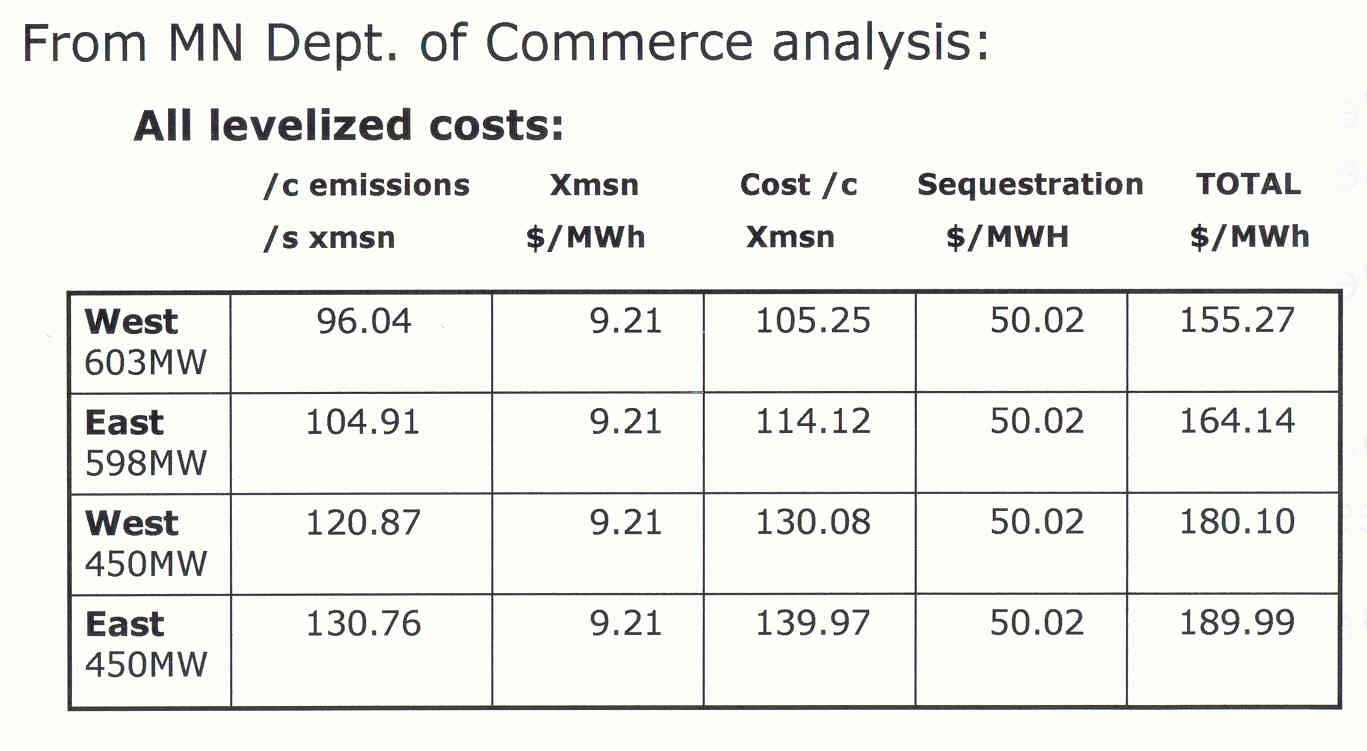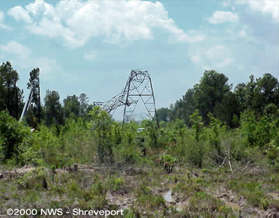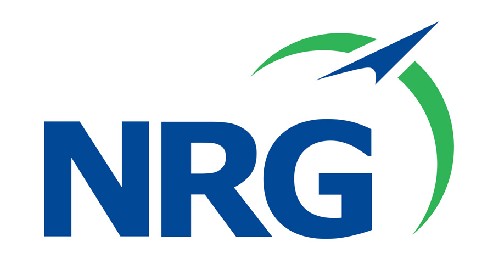WI-PSC says no Xmsn study
March 23rd, 2007
Transmission in the news, in today’s Cap Times and in Fortune Magazine, where they trot out an old NRDC pro-transmission piece:
March 22, 2007
The state Public Service Commission today denied a request by Dane County and the city of Madison for an independent study on the need for new power lines in the area.
“One-hundred years ago, the Wisconsin Legislature created the PSC, an independent state agency, to ensure the state has a safe, reliable and affordable energy infrastructure and that the public’s best interest is protected,” PSC Chairperson Dan Ebert said in a statement. “PSC staff is dedicated to energy planning and is constantly reviewing transmission needs at the local, state and regional levels. The staff has the technical expertise and professionalism to perform the thorough, comprehensive and independent analysis that the city and county requested.”
The PSC has the authority to approve, deny or modify any proposed electric construction project.
The PSC said that under state law it must determine if there is a need for a proposed transmission line and consider alternatives, including different energy sources, route options and energy efficiency and conservation measures. The PSC also must consider individual hardships, engineering, economic, safety, reliability and environmental factors during its review process.
“The PSC has a long history of having an open process and encouraging those who may be affected by commission decisions to get involved,” PSC Commissioner Mark Meyer said in a statement. “Dane County residents who voted in support of an independent transmission study can rest assured that the Commission will look at every possible alternative and will consider the comments, suggestions and testimony provided for each case when making decisions on upcoming proposals.”
The joint request came from County Executive Kathleen Falk, Mayor Dave Cieslewicz and County Board Chair Scott McDonell.
“The Public Service Commission is the place to turn to for an independent study,” Falk said in a statement at the time. “It has the tools and access to the independent expertise necessary to determine if transmission lines are needed.”
Last November, Dane County voters overwhelmingly approved an advisory referendum calling for the independent study to determine the actual energy needs in the area.
American Transmission Co., the power line company for Wisconsin, has proposed constructing a controversial 345-kilovolt line across southern Dane County, with one of the three possible routes going along the Beltline freeway.
ATC has maintained an independent study has already been done and has no intention of paying for another one.
========================================
And now, from Fortune Magazine, an argument for transmission… ummmmm… get real, when was the last time you heard of a transmission line denied? The reality is way different than this mantra:
Fixing the grid
Everyone wants electricity, but no one wants new power lines in their backyard, says Fortune’s Marc Gunther.
FORTUNE Magazine
By Marc Gunther, Fortune senior writer
March 22 2007: 7:11 AM EDTNEW YORK (Fortune) — Here’s an idea that won’t spark much controversy: To provide clean, reliable and affordable energy, and to effectively fight global warming, America needs to upgrade its electricity grid.
The GridWise Alliance, a coalition to promote a stronger grid, counts among its members the nation’s big utility companies, as well as GE (Charts), IBM (Charts), the Tennessee Valley Authority and the U.S. Department of Energy.
But just try to build a new high-capacity transmission line – and you can’t upgrade the grid without new power lines – and you’ll get not only controversy, but protests, lawsuits, efforts to sidestep the regulatory process and acts of Congress, if opponents get their way.
Some of the opposition comes from people who call themselves environmentalists – even though new power lines will enable development of renewable energy sources, particularly wind power.
One case in point: The proposal by a company called the New York Regional Interconnect, or NYRI, to build a 200-mile transmission line from Utica to Middletown, N.Y., to bring more electricity to New York City and its suburbs.
The developers say the power line is needed to improve the grid’s reliability in New York. They also say it will enable cleaner power, with fewer greenhouse gas emissions.
“You can’t have big wind projects and hydro projects in New York City,” says Bill May, the NYRI’s project manager. “Transmission is the resource that connects rural areas where renewable energy can be generated with urban areas where electricity is needed.”
In truth, there’s no guarantee that the electricity moving from upstate to the city would come from renewables; it could come from burning coal. But better transmission makes it easier for wind and solar power sources to compete against fossil fuels. Once wind turbines are built, they can generate electricity at a lower cost than fossil-fuel plants.
Special report: Going green“In essence, the transmission network defines the marketplace for buying and selling power: If it is robust and flexible, so is the market for power. If it is limited, congested and rigid, the market will be equally rigid,” says Michael Powers, the owner of a small solar power firm and a board member of Global Energy Network Institute, a non-profit research group based in San Diego.
The NYRI planners say that about 80 percent of their route runs on existing utility or railroad corridors. They applied for a permit at the state’s Public Service Commission, whose job it is to analyze the options and decide whether to grant a permit for the power line.
Then trouble arose. State legislators enacted a law designed to block the power line by denying the developers the ability to use the power of eminent domain to buy property along the way. In February, a Democratic congressman from upstate New York named Maurice Hinchey introduced a bill of his own to prevent the Federal Energy Regulatory Authority from stepping in if the state denies NYRI its permit. The 2005 Energy Policy Act grants authority to the federal government to overrule states and localities – precisely because of the difficult of getting new power lines built.
Hinchey declared: “No one wants massive towers or power lines cutting through the Upper Delaware Scenic River Valley or their backyard for that matter.”
Ah yes, the backyard. This sure sounds like a classic NIMBY (not in my backyard) problem. Everyone wants electricity. Everyone’s ready to blame the power company when the lights go out. Everyone favors renewables. Just so long as the 130-foot towers don’t go anywhere near anyone’s house, or farm, or park, or school.
This isn’t just a New York issue, of course. In northern Virginia, a plan by Dominion Power to build a 240-mile power line has run into a buzzsaw of opposition, including a lawsuit by one of the region’s most powerful developers, whose family lives nearby. American Electric Power has also met initial resistance as it seeks to develop a major transmission line from West Virginia through Maryland and Pennsylvania to New Jersey.
To be sure, these billion-dollar construction projects may – or may not – have make sense as planned. Other solutions to relieving grid congestion may be preferable, including energy-efficiency programs, pricing strategies to reduce demands during peak periods or more distributed or localized generation, such as small-scale solar and wind projects. The Bonneville Power Administration, a federal agency that delivers electricity to much of the Pacific Northwest, has found smart and lower-cost ways to upgrade its grid that you can read about in an article published by the Natural Resources Defense Council.
But there’s no question that some new power lines are needed, and the role of state and federal agencies is to decide where – balancing local objections against the broader need for clean, reliable and low-cost power. The NYRI, at the behest to state regulators, is now looking at alternate routes.
“Why don’t the legislators trust the regulatory process?” asks Len Singer, general counsel to NYRI. “It’s up to us to prove our case. What are they afraid of?”
It’s a good question. The NYRI’s opponents charge the power lines will mean “unprecedented environmental, economic and community damage,” higher electricity prices, hazards to public safety, and disruption of children’s camps, schools, playgrounds, historic properties and archaeological sites.
They may well be right. But if they are, stopping the power line should not take state laws targeted at one company, let alone an act of Congress.
Lindstrom requests Task Force extension
March 23rd, 2007

Xcel’s application for the Chisago transmission line is at the PUC, wtih the Certificate of Need and Siting dockets mixed into one. They’re trying to ram it through unexamined, setting up a Advisory Task Force with virtually no notice and having three meetings crammed into an eight day period — that’s not sufficient time for anyone to get the application, review it, and comment coherently. So we’ve filed a Motion for an extension to have a reasonable amount of time, rather than this farce they’ve instituted. Sure, they don’t want an effective Task Force like the last time, heaven forbid that local governments and the public should have an opportunity to participate in a meaningful way.
Lindstrom Motion for Extension
And with that report and appendices, you can see how it should be done.
CLICK HERE for Xcel’s Chisago transmission site.
For the dockets, go to www.puc.state.mn.us and then “eDockets” and then “Search Documents” and then search for dockets 04-1176 and 06-1667 .
NRG gets pissy at PSC
March 21st, 2007
Yesterday’s PSC meeting was a bit much — it lasted until 6:30 p.m., but the good news is that the non-utility intervenors, who had been lumped together in an inexplicable Order by the RFP hearing examiner (Order HERE — well, it will be when the inaccessible PSC site is back up and running) were finally granted intervention separately as full parties in the RFP docket. WHEW! A start.
But late the night before the hearing, NRG filed documents “under seal.” Apparently they threatened to sue the PSC — don’t they have any manners? If they want to sue, just do it!!! Then we can get to the “merits” which of course are non-existent. Release the info, DUH!

Until they get around to releasing their info, until the PSC orders it or, as Muller suggested, the PSC throws out the NRG proposal because of their (un)reasonable attitude, consider the emissions info from the Excelsior docket:
And then there’s that little matter of cost — here it is from the Excelsior docket, the Amit testimony — assume NRG is similar unless proven otherwise:

Get pissy all you want, NRG, but WE KNOW THE TRUTH ABOUT IGCC! We know the emissions profile sucks and we know the cost is outrageous, and we don’t want to pay for it!
NRG says it will sue to hide emissions data
By AARON NATHANS, The News Journal
Posted Wednesday, March 21, 2007
NRG Energy said it will sue to block the disclosure of emissions data and other information contained in its bid to the state to build a new power plant.
On Tuesday night, after a five-hour meeting, the Public Service Commission voted to release portions of NRG’s bid, including the emissions data, within five business days. NRG has vowed to try to find a court that will halt the disclosures.
“We will pursue an appeal on this matter,” said NRG attorney Michael Houghton. “We will act quickly.”
The commission agreed with a staff recommendation to keep financial details private.
At Tuesday’s meeting, NRG made a last-minute bid to keep additional portions of its bid secret, and succeeded in several areas. The commission agreed to keep secret detailed staffing plans for the proposed plant.
Alan Muller of Green Delaware argued at the meeting that the plans should be released because the company has used job creation as one of its selling points.
The commission also agreed to keep private a PowerPoint presentation from an NRG supplier and contract language between NRG and a supplier, which NRG argued were protected by a confidentiality agreement.
The commission agreed to keep private two sections of the bid relating to the price of its proposed product, despite commission staffer James Geddes’ description of them as “rather generic.”
Most commission members hadn’t read an NRG memo filed under seal Monday by the time the meeting started. They took a 45-minute recess to review the memo, then went into a rare closed session to confer with staffers. The News Journal raised an objection to the closed session, claiming it was not supported under the state’s open meetings law.
NRG is proposing a 600-megawatt coal plant for its Indian River facility. The plant would use technology that turns coal into synthesis gas, allowing for some toxins to be removed.
The proposal is one of three to supply energy to Delmarva Power to help meet the state’s long-term energy needs. The other bidders are Bluewater Wind, which wants to put up an offshore wind farm, and Conectiv, which wants to build a natural gas plant. Both have released their emissions data.
NRG officials say they should be exempt from releasing emissions data and other information because their technology is so new in the United States that releasing it would give competitors an unfair advantage. If the company revealed its suppliers, “we’re standing here with our pockets open, ready to be fleeced,” said Caroline Angoorly, the company’s regional senior vice president.
But Muller said more disclosure is better.
“NRG appears to be a company with a lot to hide,” Muller said. “If their bid could stand up to scrutiny, why do they seem so determined to conceal the main underlying facts?”
A state consultant has said Conectiv’s bid best meets the criteria the state set out for the bidders. Bluewater Wind came in second, and NRG last.
Delmarva says it would prefer not to contract with any of the bidders, believing it could keep prices stable with a combination of conservation and competitive buying on the open market.
The commission made its order Tuesday after receiving a Freedom of Information Act request from The News Journal and others. Its order covers all three companies; NRG had blacked out the most information.
Copyright ©2007, The News Journal
My email server ist kaput
March 21st, 2007
… so if you think I’ve dropped off the planet, naaaaaaaah, you should be so lucky! The 10-20 minute server switch that Cannon Communications scheduled for Monday morning (ummmm, why not 3 a.m. on Sunday?) is now going on 48 hours and I’m about to blow a gasket.
Secrets – IGCC cannot stand the light of day
March 18th, 2007
All over the U.S., they’re trying to keep the facts of IGCC from the public. Why? DUH, because if the facts were known, IGCC would be dead.
Well, surprise, surprise, it’s PUBLIC INFORMATION!!! Nearly all of the Minnesota information is public, and despite this very public collection of IGCC information, Delaware, Indiana and Florida are keeping essential facts from the public.
But wait… it gets worse… some thing the public has no interest in the information, that the public has no business in these proceedings, that the public is not a stakeholder.
Can you believe it??? From the Delaware Public Service Commission Staff:
… although the public is a beneficiary of the work performed by Commission Staff in its attempt to release as much information as possible, the public is not a stakeholder in the Commission’s, and other agencies’, determination as to whether such work should be adopted.
DAG Memo on Confidentiality 2-12-07
NRG on Confidentiality 2-16-07Staff Memo on Confidentiality 2-23-07
Hiding the facts in Indiana:
Hiding the facts in Minnesota:
Hiding the facts in Florida:
For all of you who want to know what’s what in coal gasification, go to www.mncoalgasplant.com and start digging. The Minnesota PUC filings are there, and are also available at www.puc.state.mn.us, go to “eDockets” and then to “Search Documents” and then search for 05-1993. This docket is the first one to come down the pike, and the costs are so high and the environmental performance so low that it will fall on its own. And this is the information that must get out — this information tanks any IGCC proposal.
If you have any concerns about what this all means, see:
Steve Jenkins has spent a career promoting IGCC, and he explains it all — he knows the problems and testifies about them at great lengths. But folks, it’s really not that complicated. Message: IGCC can’t stand the light of day.



